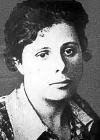Nina Karlovna Bari

November 19, 1901 - July 15, 1961
Written by Giota Soublis, Class of 1998 (Agnes Scott College)
Nina Karlovna Bari was a woman whose contribution to mathematics was great. She lived in a period when mathematics started to become more and more popular in Russia. She gained the respect from all mathematicians of her time not only because of her work but also because of her excellent personality.
Bari was born on November 19, 1901 in Moscow, Russia. She was a woman who developed great mathematical abilities and skills while she was in high school. After high school she attended Moscow State University, and she was its first woman student. At Moscow State, she became a member of several mathematical groups. In 1918 she joined a group called "Luzitania." It was a group of students who followed Nikolai Nikolaevich Luzin's mathematical ideas. Luzin was a professor at Moscow State University. ["Luzitani" came from his name] The members of that group were called "Luzitanians" and their goal was to investigate the mathematical field of function theory. Even after the group broke up, Bari decided that function theory was going to be the major subject in her research. Bari was a very good student at Moscow State. For that reason she graduated early in 1921, and she started working as a teacher at the Moscow Forestry Institute and the Communist Institute. Shortly after she began teaching, the Research Institute of Mathematics and Mechanics opened at Moscow University. She became a student at the Institute to do research on trigonometric series, while at the same time she continued to teach. She specifically focused on the analysis of various trigonometric series. She was eager to solve the problem of the uniqueness of trigonometric series. "The basic question in her thesis was: Under what conditions is a trigonometric development of a given function unique?" (Women of Mathematics, A Bibliographic Sourcebook, p.10) In 1922, she presented her principal conclusions on trigonometric series to the Moscow Mathematical Society (the first woman to do so). In 1923, she published those results. In 1926, she was given the Glavnauk Prize for her explanations to various difficult problems on trigonometric functions.
The same year she went abroad to study. She studied and worked for six months at the Sorbonne and the College De France in Paris. One year later she visited Lvov, Poland, where she attended the Polish Mathematical Congress. In 1928 she went to Bologna, Italy. There she gave speeches at the International Congress of Mathematics. Later the same year, she was awarded the Rockefeller bonus which gave her the great chance to continue her studies in Paris until 1929. By 1935 she had progressed into a very well established professor. She really enjoyed being a teacher and she participated in many mathematical seminars. One of them was the Third-All Union Congress in Moscow in 1956 where Bari gave lectures about her work on trigonometric series. She also gave many other lectures at the Moscow Polytechnic Institute, Sverdlov Communist University and the Moscow Lenin State Pedagogical Institute. In 1935, she was awarded the degree of Doctor of the Physical-Mathematical Sciences.
In 1952, Bari published a remarkable article on primitive functions and trigonometric series converging almost everywhere. "A primitive of a function f(x), defined on an interval [a,b], is any continuous function F(x) for which F(x)=f(x) almost everywhere on [a,b]." (Women of Mathematics, A Bibliographic Sourcebook, p.10) In that article Bari tried to prove that "every function that is finite and measurable almost everywhere has a primitive whose Fourier series, differentiated term by term, converges to the function almost everywhere." (Women of Mathematics, A Bibliographic Sourcebook, p.10) She also obtained significant results about properties of orthogonal and biorthogonal systems. Some of those systems were the Bessel system, Hilbert system, and Riesz-Fischer system. Bari also wrote a monograph of nine hundred pages. In this book she talked about all kinds of problems involving trigonometric series. Her monograph has become the basic reference for all mathematicians focusing on the theory of functions and the theory of series.
Bari was considered to be the principal leader of mathematics at Moscow State University. She helped many students earn their Ph.D. and improve their theses. She did everything she could to give to others the spirit of her work. Besides mathematics, Bari had other interests too. She used to hike and be a tourist and she really liked poetry and music.
Her death on July 15, 1961 was a lost to all mathematicians. She was a special person and even now is known and remembered for her marvelous work.
December 1995References
- Women of Mathematics: A Bibliographic Sourcebook. Edited by Louise S. Grinstein and Paul J. Campbell. Greenwood Press. 1987.
- Obituary, Russian Mathematical Surveys. 17(1) 1962 p.119-127.
- Author Profile at zbMath
- MathSciNet [subscription required]
- Biography at the MacTutor History of Mathematics Archive
